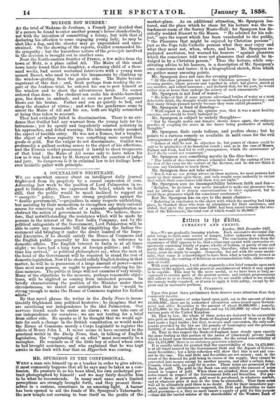MR. SPURGEON IN THE CONFESSIONAL.
Writx a man sets himself up as a teacher in order to give advice, it most commonly happens that all he says may be taken as a con- fession. He presents to us his beau ideal, his own archetypal por- trait photographed by himself; and we may fairly describe him to be what he recommends. In many such eases men's limited perceptions are strongly brought forth, and they present them- selves in a curious, sometimes in an amusing light. A bazaar has been opened to aid the funds of Mr. Spurgeon 's Tabernacle ; the new temple not scorning to base itself on the profits of the
market-place. As an additional attraction, Mr. Spurgeon lec- tured, and the place which he chose for his lecture was the re- freshment-room of the Surrey Music-Hall; for Spurgeon has de- cidedly wedded Dissent to the Muses. "He selected for his sub- ject," says the report which has been vouchsafed to the public, "the Pleasures that might be enjoyed by Christian persons" ; just as the Pope tells Catholic persons what they may enjoy and what they must not, when, where, and how. Mr. Spurgeon re- pudiated asceticism, but warned his hearers "against pleasures which the conscience told were not pleasures that should be in- dulged in bya Christian person." Thus the lecture, while con- stituting advice to his hearers, is a description of Mr. Spurgeon's own conscience and tastes : it is a biographical sketch, from which we gather many amusing points. Mr: Spurgeon does not care for evening parties-
" Of this class [pleasures not meet for Christian persons] he instanced evening parties, where persons met together in white kid gloves, stared at one another, and talked nonsense ; and declared that, for his part, he would rather stop at home than undergo the misery of such amusements."
Mr. Spurgeon is not fond of water-
" He believed that if some persons advertised bottles of water as a most delectable drink, the draught would soon be considered a great delicacy ; and that many things pleased merely because they were called pleasures."
Mr. Spurgeon is fond of dancing-
" With regard to dancing, his opinion was, that it was a most healthy exercise, and should be freely indulged in." Mr. Spurgeon is subject to unholy thoughts— "But he thought males and females should dance apart, the ordinary practice of coupling the sexes in the dance being productive of unholy thoughts."
Mr. Spurgeon finds cards tedious, and prefers chess; but he points to a curious remedy as available in mild cases for the evil consequences of gambling-
" Games of skill he saw no objection to, but games of chance could be said to be productive of no beneficial result ; and, as in the case of Messrs. Palmer and Cook, had led to evil consequences, which the countenance of Lord Derby could not counteract."
Mr. Spurgeon sees something mystic in the dice-box-
" The rattle of dice-boxes always reminded him of the casting of lots at the foot of the cross for the vesture of the Saviour, and he did not think it became any Christian to touch them."
Mr. Spurgeon does not take advice-
" But it was no use giving advice on these matters, for most persons had made up their minds upon them, and only sought some authority to excuse that which their consciences told them was not right."
Mr. Spurgeon sees no incompatibility between faith and fun-
" Religion, he declared, was never intended to make our pleasures less; and he advises all to despise conventionalism in their enjoyment, but to avoid those pleasures which the conscience condemned."
But Mr. Spurgeon has an eye to the main chance-
" Referring in conclusion to the object with which the meeting had taken place, he thanked those who were in attendance for their assistance, and stated, that up to the present time 6200/. had been raised towards the erec- tion of the Tabernacle, the total cost of which would be 20,0001."


































 Previous page
Previous page